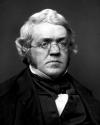Biography
William Makepeace Thackeray /ˈθækəri/ (18 July 1811 – 24 December 1863) was an English novelist of the 19th century. He was famous for his satirical works, particularlyVanity Fair, a panoramic portrait of English society.
Perhaps best known as a novelist, William Makepeace Thackeray was born in Calcutta, India, in 1811. His father died when he was five, and Thackeray was sent to England to be educated. He eventually attended the Charterhouse School—infamous for its discipline—and Trinity College, Cambridge, which he left after two years. After traveling to the continent and leading a life of socializing and gambling, he worked as a freelance journalist, submitting work to Punch, the Times, and other publications. Some of his novels were also published in serialized form in magazines. He wrote travel books, among them The Paris Sketch Book (1840) and From Cornhill to Grand Cairo (1844), and novels, including Vanity Fair (1847–48), Pendennis (1848–50), The Newcomes (1853–55), and The Virginians (1857–59). Thackeray’s wife suffered from depression, and in later life, he was frequently occupied with searching for a cure for her illness and raising their two children.
Thackeray first wrote poetry while he was a student at Trinity. He wrote occasional poems, ballads, comic poems, and parodies, and some of his poems were published in Punch. In On the Art of Thackeray, H.N. Wethered noted that Thackeray “set the fashion for a type of light accomplished society verse which was remarkable for its vigour, daintiness and sense of rhythm.” Thackeray died, unexpectedly, in London in 1863.






